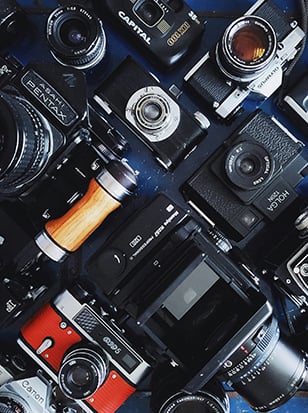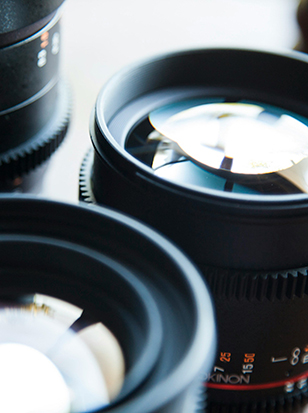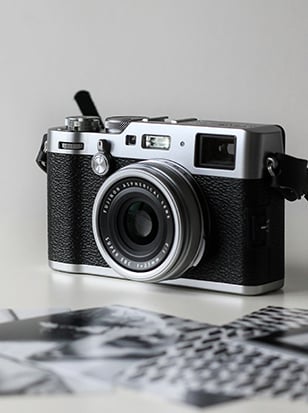
When you’re using a medium-format camera, resolution is king. You’ve got a large sensor with a large megapixel count, and you want to make the most of it, so you need a lens with ample resolving power. You want sharpness that’s edge to edge and corner to corner, you want images that are free from distortions and aberrations, you want brightness right to the edges of the frame.
So, no small challenge then! Fortunately, manufacturers are up to the task. In the past couple of years we’ve seen plenty of excellent lenses arriving for medium-format systems. Built for outdoor weather, with sophisticated internal optical constructions that ensure images are pin-sharp and perfect, these lenses help you get the right result every time, whether you’re shooting telephoto or wide-angle.
One thing to remember when looking at medium-format lenses – as a medium-format sensor is larger than full-frame, the equivalent focal length will actually be lower than stated.
That’s enough chat from us – let’s get to the lenses!
Quick Navigation
Best Fujifilm GF lenses
The Fujifilm GFX system continues to redefine what is possible in medium format, packing ultra-high resolution sensors into camera bodies that are portable and fast. The lenses need to be of peerless quality to make the most of the megapixel counts on the cameras – which generally break triple digits. Fortunately, the GF-mount lenses are up to the task, boasting top-notch optical quality that delivers ultra-sharp images from edge to edge of the frame.
As this is Fujifilm we’re talking about, many of these lenses also deliver brilliantly rich bokeh in the defocused areas of images. Just like the cameras, the lenses are up to the task of shooting basically any subject. The range is mostly just Fujifilm-made, though there are some third-party options from Laowa and TTArtisan.
Here are just a few of our absolute favourite lenses for the Fujifilm GF mount.
Fujifilm GF 100-200mm f5.6 R LM OIS WR Lens
Fujifilm has designed some stunning lenses over the years and this GF 100-200mm f5.6 R LM OIS WR is no acceptation. This lens, which comes as part of the GF lens line up and for use with Fujifilm's GFX range of medium format cameras, has a large and versatile focal range; 100-200mm which equates to a 79-158mm focal range in 35mm full frame format. It features an f/5.6 to f/32 aperture range with a constant f5.6 aperture throughout the focal range. Its lens construction is built up of 20 glass elements in 13 groups, 2 super ED elements and 1 aspherical which together can produce pin sharp images that will highlight the incredible capabilities of the GFX camera line-up.
£1,799.00 View
Pros:
- Excellent weather-sealed build quality
- Performs well throughout zoom range
- Nice bokeh quality
Cons:
- Relatively slow max. Aperture
This powerful telephoto zoom is designed for Fujifilm’s digital medium-format GFX system, providing a focal range equivalent to 79-158mm in 35mm full-frame terms. Like the GFX cameras, it’s built to be tough and durable, with a weather-resistant construction that’ll see it more than standing up to the rigours of a day’s landscape shooting. It’s weather-sealed in 10 areas, and is also capable of operating in temperatures as cold as -10°C.
Impressively lightweight for its size, this lens delivers amazing high-resolution performance and rich bokeh. Its autofocus is driven by a linear motor and is silent and fast, able to acquire subjects quickly and efficiently, and its powerful 5-stop image stabilisation system expands its utility handheld. Constructed internally of 20 elements in 13 groups, including two super ED elements and one aspherical to suppress field curvature and chromatic aberrations, it’s guaranteed to deliver superb images with impeccable sharpness. Make the most of your GFX camera’s peerless resolution and deliver results at range with this exceptional telephoto zoom.
Fujifilm GF 250mm f4 R LM OIS WR Lens
Fujifilm's GF 250mm F4 R LM OIS WR Fujinon lens is the ideal partner for the Medium Format GFX 50S. This ultra-high quality telephoto lens offers an approximate equivalent focal range of 198mm, while the inclusion of one superED and two ED lens elements greatly reduce chromatic aberration. Users can shoot down to a minimum of 1.4m with a 0.22x magnification ratio making tele-macro shots possible.
£2,799.00 View
Pros:
- Physical control buttons
- Weather-resistant build
- Optical stabilisation
Cons:
- Somewhat big and heavy
Fujifilm has provided the perfect telephoto prime partner for one of its GFX cameras in the form of the GF 250mm f4 R LM OIS WR Fujinon Lens, an ultra-high-quality lens that provides an equivalent focal length of 198mm. Its optical construction includes ED and Super ED elements, ensuring that shots are as sharp as possible and it offers loads of useful on-board functions, including a focus limiter and four focus control buttons.
The magnesium-alloy build of the Fujifilm GF 250mm f4 R LM OIS WR Fujinon Lens allows it to work in environments as cold as -10°C, and it also boasts a fluorine coating to repel water and dirt from the front element. The linear motor provides autofocus that works without excessive noise, and photographers can also make use of the impressive minimum focusing distance of 1.4m to get closer to their subjects, allowing for unrivalled creativity, versatility and expression.
This is a winning lens that reflects the top-notch quality of the GFX cameras, and any medium-format photographer using this system will find it makes a superb addition to their kit bag. Push your images further – literally and figuratively. This high-quality telephoto lens is the way to do it.
Best Hasselblad X lenses
Like Fujifilm’s GF-mount, the Hasselblad X system is pushing medium format forward in terms of the level of flexibility it offers, with cameras that are lighter and faster than any that have come before. The XCD lenses are the perfect complement, delivering ultra-sharp optics that have gone through a rigorous battery of tests in the firm’s headquarters in Sweden. This allows the makers to ensure that the lenses will deliver the kind of quality required by high-resolution cameras such as the Hasselblad X2D 100C.
The lenses in the system are mostly Hasselblad-made, and there’s a broad selection of primes and zooms. XCD lenses are also equipped with an integral central shutter, which allows for fast shutter speeds and full flash synchronisation.
Hasselblad 135mm f2.8 XCD Lens
The Hasselblad 135mm f2.8 XCD Lens is a short telephoto prime providing a 135mm focal length. It compares to a 105mm full frame lens, making it perfect for portrait or landscape photography. The XCD 135mm features a 1m close distance setting and an aperture range between f2.8 and f3.2.
£3,708.00 View
Pros:
- Brilliant for portraits
- Compatible with teleconverter
- f2.8 aperture is good for low light
Cons:
- Not many!
Comparable in equivalent focal length to a 105mm full-frame lens, the Hasselblad 135mm f2.8 XCD Lens is perfect for all sorts of applications from portraits to landscapes. Its close-focusing distance of 1m means you can also get up close and personal with your subjects, providing you with a broad range of options for your shoots, and its combination of edge-to-edge sharpness and compact form factor is designed to compliment the high-resolution Hasselblad X1D.
Durable and lightweight, the Hasselblad 135mm f2.8 XCD Lens weighs 935g and measures 149mm, with a filter thread diameter of 77mm. The maximum aperture of f/2.8 means it’s great in low light as well as daytime, further expanding your shooting options. Sharp from corner to corner, and equipped with a speedy autofocus system, this lens lets you take your medium-format creativity that much further.
Hasselblad 65mm f2.8 XCD Lens
The Hasselblad 65mm f2.8 XCD Lens is the ideal standard lens in any X System photographer's kit. With a 50mm full frame equivalency, it's designed to achieve the 'normal' focal length and mimic the human field of view. Thanks to its f/2.8 maximum aperture and 0.5 m (20 in.) minimum focus distance, the XCD 65mm is the versatile option for street, travel, and general photography.
£2,508.00 View
Pros:
- Useful naturalistic focal length
- Lightweight build
- Can focus at close distances
Cons:
- Some noise in use
When a 65mm lens such as this one is paired with a medium-format sensor, it delivers a full-frame equivalent focal length of around 50mm – a similar field of view to that of the human eye. This makes the Hasselblad 65mm f2.8 XCD Lens an excellent lens for street, travel and documentary photography – the kinds of genres where you want a naturalistic field of view.
With this in mind, Hasselblad has given this lens a generous degree of versatility, with a 0.5m minimum focusing distance and a maximum aperture of f/2.8, so you’re covered for working in close-up, low light or a multitude of other shooting situations. Weighing just 727g and delivering corner-to-corner sharpness, the Hasselblad 65mm f2.8 XCD Lens makes for a fantastic companion to the X1D. Its filter thread is 67mm and it measures just 93mm in length, making it portable and easy to transport.
Hasselblad 21mm f4 XCD Lens
The XCD 21mm is an ultra wide-angle lens for the X System. Its extremely short focal length provides a 17mm full frame equivalent lens, making it perfect for landscape and architecture photography. The lens features a 32 cm close distance setting (1:10 image scale) and an aperture range between 4 and 32.
£3,195.00 View
Pros:
- Ultra-wide perspective
- Close focusing distance
- Brilliant sharpness even at max aperture
Cons:
- Some vignetting
- Not stabilised
This ultra-wide prime delivers a full-frame equivalent focal length of 17mm, making it an exceptional choice for landscape and architecture photography. These aren’t its only applications however – the close focusing distance of 32cm also means it’s excellent for close-up work, allowing you to experiment with creating massively exaggerated perspectives and showing your subjects in a unique and creative way.
Like other XCD lenses, this optic has an integral central shutter, meaning it can work with a wide range of shutter speeds and provide full flash synchronisation up to 1/2000th of a second. It provides fast and accurate autofocus, perfect for those tricky subjects, and boasts a sophisticated optical construction that ensures images are pin-sharp and aberration-free from corner to corner and edge to edge. Delivering deliciously sharp and high-contrast results, the Hasselblad 21mm f4 XCD Lens is a medium-format winner.
Best Pentax 645 lenses
The professional Pentax 645 system is based around the Pentax 645Z, a digital medium format camera that produces ultra-high quality images from its 51MP sensor. With full weatherproofing, it’s a medium format camera for outdoor shooting – and there are plenty of 645-fit lenses that are built to match. Look for the “AW” acronym in the lens name, which in Pentax vernacular refers to “All Weather”, and means that a lens is sealed to withstand inclement conditions.
There are plenty of lenses throughout the range that deliver exactly the kind of quality this large-format camera requires. In this section, we’ve highlighted just a couple of our favourites from the range.
Pentax-FA645 smc 200mm f4 (IF) Lens
The Pentax 200mm f4 SMC FA IF telephoto prime lens is designed for use with Pentax's 645 medium-format cameras, both film and digital. Its Inner Focusing mechanism keeps the lens compact and lightweight, and the Super Multi Coating (SMC) significantly increase the amount of light transmitted by the lens to ensure clear, detailed images.
£999.00 View
Pros:
- Weather sealing
- Shake Reduction stabilisation
- Advanced coatings deliver excellent performance
Cons:
- Fairly short zoom range
Covering an equivalent range of 22-35.5mm, this isn’t exactly the most versatile zoom on the block. However, given that it’s equipped with weather resistance and Pentax’s Shake Reduction stabilisation technology, the Pentax-DA645 HD 28-45mm f4.5 ED AW SR makes up for it in other ways. With an advanced optical construction, the lens enhances its resolution via two high-performance aspherical elements and two ED (Extra-low Dispersion) elements.
Also on board are Pentax’s advanced coatings, including high-grade, multi-layer HD Coating, and an anti-reflective coating on the interior of the barrel, and Pentax’s proprietary high-grade Aero Bright Coating. All this delivers superior light transmission for images that are sharp, punchy and full of clarity and contrast.
Pentax-FA645 smc 200mm f4 (IF) Lens
The Pentax 200mm f4 SMC FA IF telephoto prime lens is designed for use with Pentax's 645 medium-format cameras, both film and digital. Its Inner Focusing mechanism keeps the lens compact and lightweight, and the Super Multi Coating (SMC) significantly increase the amount of light transmitted by the lens to ensure clear, detailed images.
£999.00 View
Pros:
- Good telephoto reach
- Compact, lightweight build
- Consistent image quality
Cons:
- Not stabilised
- Not weather sealed
Giving a nice level of telephoto reach, the Pentax-FA645 smc 200mm f4 (IF) Lens has been an enduringly popular lens among 645 enthusiasts. The “IF” in the name stands for “Inner Focusing”, referring to the fact that the focusing mechanism is completely internal and doesn’t change the length or balance of the lens.
Focusing in general is pretty fast by medium format standards – not a patch on newer GFX or XCD lenses, but still very good. The longer focal length and f/4 aperture make it easy to throw out the background for shallow depth-of-field images, and the Super Multi Coating (SMC) helps with light transmittance. Optically this is a lovely lens that is well suited to all purposes, including portraits and landscapes if you don’t mind a narrower perspective.
Pentax-D FA645 HD 35mm f3.5 AL (IF) Lens
The Pentax 35mm f3.5 AL IF HD is a wide-angle prime lens designed for the Pentax 645-series of medium format cameras. The lens incorporates newly designed aspherical optical elements and HD Coating to ensure high-contrast, high-resolution images are delivered, even in dimly lit environments. Its wide-angle perspective is perfect for capturing landscapes, architecture and interior shots.
£1,599.00 View
Pros:
- Wide perspective is great for architecture
- Lovely contrast
- Compact, with internal focusing
Cons:
- Not weather sealed
Another enduringly popular lens among 645-wielding Pentaxians, the Pentax-D FA645 HD 35mm f3.5 AL (IF) Lens has found particular favour with architecture shooters. This is not just for its wide perspective (although that is a definite plus), but also its brilliantly dependable high-resolution quality, with great control of aberration and distortion thanks to the aspherical elements in the optical design.
The nine-bladed aperture also makes it a great one for shooting wide open, producing a lovely look in the defocused areas of images. The lens is relatively compact, not adding too much weight to a 645 body, and once again it has that Inner Focusing design that means the balance doesn’t change as you focus. Excellent stuff all around.

FAQs
What is a medium format camera lens?
A medium-format camera lens is designed for medium-format cameras; cameras with larger sensors than full-frame or APS-C cameras. These lenses provide high-resolution images with superior detail, dynamic range, and tonal depth, making them ideal for professional photography.
How does a medium format lens differ from a full-frame lens?
Medium format lenses produce a larger image circle to match the larger sensor size of medium format cameras, offering greater detail and higher resolution images. They are designed for edge-to-edge sharpness and minimal distortion, which is crucial for high-end photography.
Are medium format lenses compatible with full-frame or APS-C cameras?
Generally, medium format lenses are not directly compatible with full-frame or APS-C cameras due to sensor size and mount differences. However, adapters can be used, though they may change the field of view and cause vignetting. It’s not something that we would advise doing!
What are the benefits of using medium format lenses for portrait photography?
Medium format lenses provide superior image quality, shallower depth of field for beautiful bokeh, greater dynamic range for detailed highlights and shadows, and more accurate, vibrant colours, all of which enhance portrait photography.
What should I consider when choosing a medium format lens?
Consider the focal length for your photography needs, the maximum aperture for low-light performance and depth of field control, the build quality for durability, the optical performance for sharpness and minimal aberrations, and compatibility with your camera system.
How do we decide?
Our in-house photography experts, store staff and partners all work collaboratively to pour over these guides. The cameras and equipment recommended in our guides are based on their personal opinion, empirical experience and of course, feedback from our customers. We way up price, features, quality and the all-important 'je ne sais quoi' to make sure we recommend products that will delight and inspire.
If you would like more advice on any purchase our contact centre staff are here to help. Alternatively, you can reach us via email or social media. And don't forget. If you were to purchase anything based on our recommendations you'll be covered by our full returns policy














